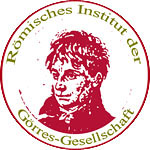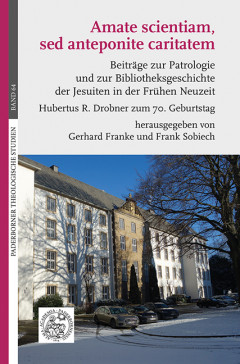Publication in honour of Hubertus R. Drobner: Amate scientiam
The inexhaustible wealth of Latin prose provides a constant source of inspiration for creating excellent titles for commemorative publications. The editors of the commemorative publication dedicated to the great Augustine scholar Hubertus R. Drobner naturally conjured up an ‘Augustine’ that even Pope Leo XIV would have enjoyed: Amate scientiam, sed anteponite caritatem.
Love science, but love even more! (from: Augustine of Hippo, Sermo 354). The editors Gerhard Franke and Frank Sobiech explain the context of this maxim in the introduction.
The volume is not a commemorative publication of the usual kind, to which colleagues are invited to contribute. Given the fame of the honoured scholar, this would probably have resulted in a five-volume work.
Hubertus Drobner, who was at the Campo Santo Teutonico seminary from 1980 to 1983 (whose current rector comes from Paderborn), had a number of research assistants during his long teaching career in Paderborn, who have now contributed to this commemorative publication. As he represented the entire history of the Church, the spectrum of contributions is correspondingly broad:
Albert Viciano Vives (Barcelona) writes about the martyr bishop Fructuosus of Tarragona from the 3rd century (with interesting references to today's Fructuosus cult and a false catacomb saint), Pablo Argárate about the Holy Spirit in Basil of Caesarea, and finally Johannes Kalde about criticism of parasitism in Christian antiquity (with delightful remarks on the immoral practices of late antique reclining painters).
The second part of the book deals with the Jesuits in the early modern period: Frank Sobiech discusses the magic books in Jesuit colleges (yet another dark chapter in the history of the holy order) and Gerhard Franke examines the patristic and conciliar literature in the library of the Paderborn Jesuits.
Finally, Maria Voß compiles Drobner's bibliography, which includes three dozen monographs alone.
If commemorative publications are always supposed to reflect the honouree in some way, then this one has undoubtedly succeeded: a broad spectrum of interests opens up, while at the same time the reader is carried away by meticulously researched individual studies, even straying into Paderborn Jesuitism, and ultimately detecting a touch of self-irony and heavenly gratitude for the winding paths of fate in everything.
- Details
- Written by: Stefan Heid
- Category: Recommended reading
 Römisches Institut der Görres-Gesellschaft
Römisches Institut der Görres-Gesellschaft







